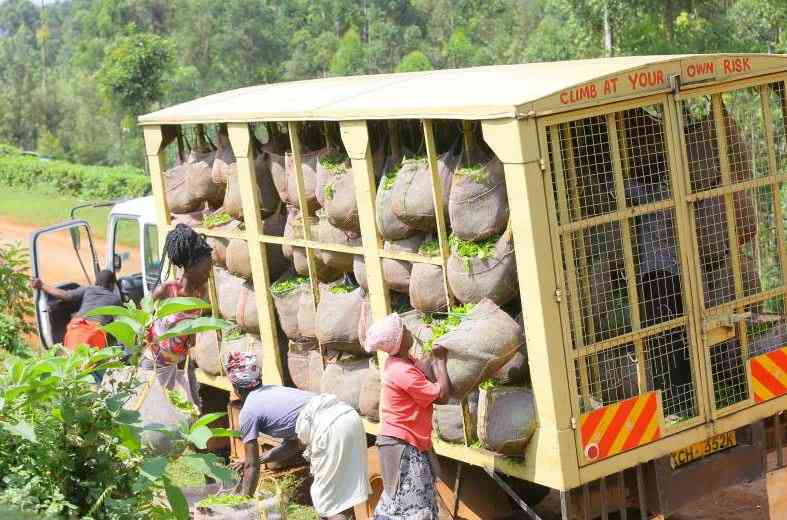
Agriculture and Livestock CS Mutahi Kagwe in a consultative meeting with tea producers, buyers and brokers at East African Tea Traders (EATTA) auditorium in Mombasa County. 13 March, 2025. [Kelvin Karani, Standard]
The Tea Board of Kenya (TBK) has directed all tea factories in the country to submit statistics on unsold tea stocks and their valuation as of April 30, 2025.
This directive comes in response to growing concerns about falling export prices and their impact on smallholder farmers.
In a circular dated May 12, 2025, TBK Chief Executive Officer Willy Mutai emphasised that the Ministry of Agriculture and Livestock Development is alarmed by the continued decline in international prices for Kenyan teas.
This decline threatens the earnings of factories and tea producers, particularly small-scale farmers.
“The Ministry of Agriculture and Livestock Development has expressed concern regarding the depressed prices for Kenyan teas destined for export and the negative effect this may have on the income of factories and earnings for tea producers, especially smallholder farmers,” said Mutai.




This directive follows a stakeholders' meeting held in Kericho on May 6, 2025, where participants reached a consensus on the necessity of establishing stock levels of unsold teas and conducting proper valuations to assess the extent of the crisis.
Each tea factory is required to submit its individual unsold tea stock position and valuation by May 23, 2025. The TBK will use this information to evaluate the severity of the situation and formulate possible interventions.
“The information will help gauge the severity of this problem,” Mutai added.
The circular has also been shared with key officials in the Ministry of Agriculture, including Cabinet Secretary Mutahi Kagwe, Principal Secretary Dr Kiprono Ronoh, and Mr Wilson Muthaura, the Group CEO of the Kenya Tea Development Agency (KTDA).
As one of the world's leading tea exporters, Kenya has been facing challenges with fluctuating global prices, leaving smallholder farmers struggling with low returns despite rising production costs.
During a visit to the Litein tea factory, Agriculture Cabinet Secretary Mutahi Kagwe announced a significant change in tea marketing policy, allowing KTDA factories to sell their tea directly to international buyers.
In a further boost to the sector, Kagwe announced the removal of taxes on packaging materials, enabling factories to brand and package their teas locally.
“Kenyan tea no longer needs to be exported to Dubai for packaging. With the tax on packaging materials removed, factories can now add value locally and enhance the market appeal of Kenyan tea,” he stated.
David Rono, Chairman of the KTDA West of Rift Smallholder Tea Factories Association, called for a rotational system in KTDA leadership to ensure fair representation of all regions.
Stay informed. Subscribe to our newsletter
“The KTDA chairmanship has been elusive for our region for decades. We now call for rotational leadership between the East and West of the Rift,” he remarked.
Wesley Koech, Chairman of Tebesonik Tea Factory, expressed concern about the aging and inefficient equipment in many factories and appealed for government support.
“We urge the government to provide concessional financing for modernization, automation, and the adoption of energy-efficient systems in our factories,” he said.